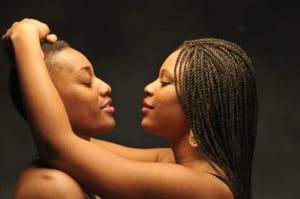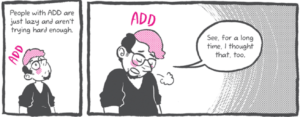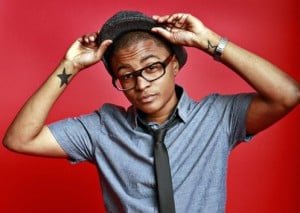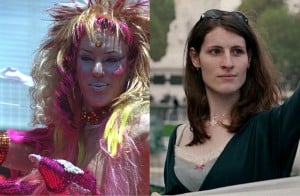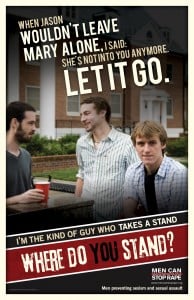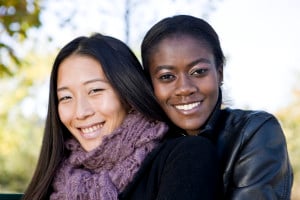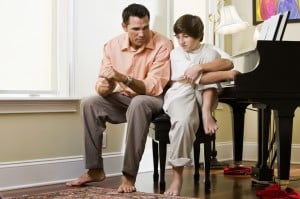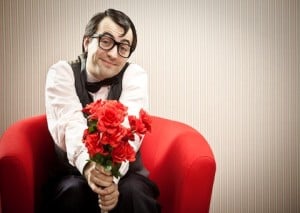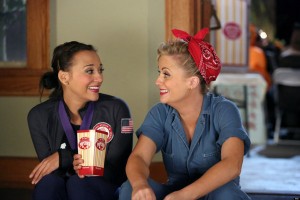
Source: Geek Insider
I remember the first time that my parents subscribed to cable television.
Other than a weird obsession that developed by watching documentaries on Shania Twain, I also began to realize where, I, as a young woman, received value.
I wasn’t consciously critiquing the shows as a tween, but I was absorbing their messages.
I watched everything from old classics like The Waltons to modern favorites such as Lizzie McGuire, Hey Arnold, and 7th Heaven.
In every one of these shows, you see age-old tropes like the crazy, resentful bitch; the love-struck-yet-clumsy teenage girl; and even, supposedly, “strong” female characters who continually overreact to the point where we can’t take them seriously.
These characters make viewers understand women in one-dimensional ways rather than establishing the lovely complexities that exist among women, as they do for all people.
I had some hopeful television in middle school, like an all-time favorite of mine, Gilmore Girls (remember that awesome time Lorelai proposed instead of Luke?), but at the same time, The Bachelor and The Swan crept onto the scene.
While these reality shows exploded, character television shows invested in female characters like Ally McBeal and Carrie Bradshaw, women who appeared to be symbols of empowerment, but couldn’t exist without a sexy strut.
Clearly, both then and now, the message was primarily that women are objects.
Women exist in stereotypes rendering them powerless or love-struck (or both!), and often, they are just sex objects belittled to their body parts. Women can’t be taken seriously, and if they are, they’re hungry for power.
And don’t get me started on diversity! For women of color, the world of television has been far bleaker. Just look at the Emmy awards, for example. No woman of color has ever won for Best Actress in a Drama, and in the last 21 years, only one woman, America Ferrara, has taken home the Lead Actress in a Comedy Series award.
Now, I’m not here to stomp on television. My Netflix account and I are in a heated relationship, and I’m not trying to turn that sour.
I am also of the opinion that as a feminist, when we begin to label everything feminist and anti-feminist, we forget that important gray area.
Carrie Bradshaw and Ally McBeal did open doors for women on TV. But, even so, we must be critical.
The second we stop using our brains and start mindlessly consuming media without recognizing its investment in patriarchy, we’ve succumbed to a woman’s “role” as an object. The patriarchy wins.
And since the average person will spend nine years of their life watching television, it’s necessary that we spend some time watching positive portrayals of multi-faceted women.
So, today, I’m not here just to critique. I’m here to celebrate.
The representations I suggest of women in television are not perfect (and there are far more that I did not list), but they are on a road leading somewhere, which is a damn good start.
You Can’t Be What You Can’t See
If you’re unfamiliar with the role white privilege plays, you can read this article or this one for a start.
But in an effort to understand it simplistically, have you ever heard someone say that women earn 77 cents for every man’s dollar? Well, not only does that phrasing annoy me, but my point is that the women referenced in that statistic are white women.
Women of color earn even less.
Black women earn 64 cents and Latinas earn 55 cents.
Their experiences in the wage gap are silenced — not even mentioned! Why? Because visibility lends itself to accessibility.
There is little visibility around women of color’s experience in the workplace. This isn’t to say these stories do not exist. They do! Most people, unfortunately, just aren’t paying attention to them because they aren’t being told in the first place.
So, when television focuses stories on primarily white, middle-to-upper class people, it comes as no surprise that women of color are ignored. This is why representation matters so much.
This is one of the reasons that Sophia Burset, played by Laverene Cox in Orange Is the New Black, is a huge step forward. She offers a story of diversity that is being celebrated in mainstream media.
Laverne Cox is the first openly transgender, African American woman to produce and act in a mainstream television show.
The show details her character’s transition, emotional journey, and difficulties to obtain her hormones while incarcerated.
Laverne has spoken out publicly against the bullying she has suffered and stood alongside transgender youth in solidarity. She has offered a window into the world of one transgender woman’s journey giving understanding to millions and hopes to many others.
She doesn’t claim to be the voice of all transgender people, but she lifts up others in the process.
Her contributions have brought visibility to the issues that people in the trans* community face, a necessity if we wish to make any progress, considering that 41% of the transgender community attempt suicide at some point.
It’s a seat at the table for someone whose voice desperately needs to be heard. And hopefully, it’s an invitation to hear from more people who do not identify as cisgender.
The Bitch Problem? It’s Handled
I like to ask questions, and I love to challenge.
If you’re a woman who likes to assert herself, good luck not being labeled a “bitch” at one time or another. It’s pretty inevitable.
It’s no wonder, considering most of the female protagonists on television and in movies are given one-sided characters who are out for cold blood.
Usually these stereotypes revolve around an old character that has no sexuality to use as a weapon (think The Devil Wears Prada) or a sex object who uses her sexuality to assert dominance over her weak male co-workers (think Ugly Betty). Old and young women are targeted equally.
That’s why I’m so excited about characters like Olivia Pope and Mellie Grant from Scandal, Carrie Mathison from Homeland and potentially, new characters in Shonda Rimes’ latest coming out next season.
These women are strong, vulnerable, flawed, concerned with love and not, and most importantly, they exhibit complexity.
Olivia Pope’s assertive nature paired with her rough familial upbringing leaves her strong and vulnerable. Mellie Grant’s silence surrounding her sexual assault and her loud voice as First Lady make her a villain and a heroine. Carrie Mathison’s mental illness and fearless diplomatic decisions give her depth.
Too often, female characters are painted with a broad brush: She’s the pretty and bitchy one. She’s the dumb one. She’s the fat one who tells jokes. She’s the power hungry man-hater.
Olivia Pope, Carrie Mathison, and Mellie Grant’s characters are far from perfectly written characters, but they give us a window into the world of women with power who are also likeable.
If we see female characters who reflect the complexities of female leaders, rather than caricatures of stereotypes, we may see more women vying for seats at the executive table, and more men taking them seriously.
Female Friendships: The Unicorns of Mainstream Television
Do you ever get the feeling that television is positioning women against one another?
Even in some of my favorite television shows, female friendships are either sparse or non-existent.
I mean, look at Olivia Pope! The girl has a better relationship with wine than she does with any of the women on the show!
That being said, Parks and Recreation has been a light in a dark place if you’re looking for honest, raw, and hilarious female friendships.
Aside from being an incredible role model, Leslie Knope is also the epitome of an awesome best friend. She and Ann Perkins celebrate each other’s existences with practice first dates, groundbreaking construction projects, and hilariously awesome conversations about their uteruses.
Leslie Knope even has an entire day dedicated to female friendships, “Galentine’s Day!”
Viewers need to see more female characters in solidarity with their fellow female characters. It provides the audience with a presentation that is so rarely seen – one that acknowledges a sisterhood.
Every time I see a female friendship on TV, I feel that it’s a swift kick to the patriarchy.
I mean, what is more feminist than lifting women up rather than tearing them down? As Leslie Knope notes: “Ovaries before brovaries,” right?
A Long, but Hopeful Road
Television can be an exhausting space for anyone who wishes to watch something that acknowledges difference, highlights the human complexity, or is looking for diverse characters who don’t exist in stereotypes.
However, some shows on television are attempting to showcase women who don’t simply exist for the pleasure of the male gaze.
These female characters may be hard to find. But hopefully, with time, if we exert our energy into watching these characters and demanding more from Hollywood, somebody will listen.
It’s a long, exhausting journey, but it is one worth pursuing.
Representation matters, so let’s start paying attention and demanding better.
Where do you find hope? How are you paying attention? Let’s start the conversation.
[ultimatesocial_facebook custom_class=”fb-btn-us”] [ultimatesocial_twitter custom_class=”tw-btn-us”]
Want to discuss this further? Login to our online forum and start a post! If you’re not already registered as a forum user, please register first here.
Amy is a senior at Wake Forest University studying Communication and Women’s and Gender Studies & Sexuality. She co-founded Gender Equality Allies, a student organization that aims to educate and raise awareness to gender issues such as body image, sexual misconduct, and stereotypes. Recently, Amy traveled to Paris to research the concept of beauty. Post-grad, she hopes to work for a feminist organization to fight injustice and spread the message of self-love. She also enjoys chocolate, traveling, and Shania Twain, always. Find her on Twitter @AnthemofAmy and Tumblr.
Search our 3000+ articles!
Read our articles about:
Our online racial justice training
Used by hundreds of universities, non-profits, and businesses.
Click to learn more
Most Read Articles
- « Previous
- 1
- …
- 30
- 31
- 32







